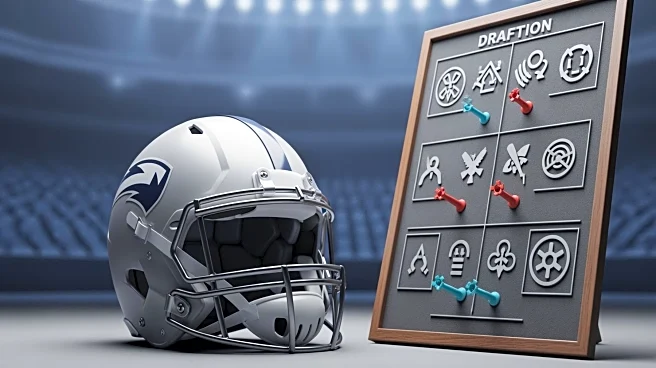What's Happening?
The New York Jets have made significant changes to their roster and draft strategy by trading star cornerback Sauce Gardner to the Indianapolis Colts and defensive tackle Quinnen Williams to the Dallas
Cowboys. These trades have resulted in the Jets acquiring multiple first-round and second-round draft picks, as well as wide receiver AD Mitchell and defensive tackle Mazi Smith. The moves are part of a broader strategy to rebuild the team for future seasons, as the Jets now hold a substantial number of draft picks for the 2026 and 2027 NFL drafts. The trades also provide the Jets with considerable salary cap space, allowing for potential future acquisitions.
Why It's Important?
These trades mark a strategic shift for the Jets, focusing on long-term team building rather than immediate success. By acquiring multiple high-value draft picks, the Jets are positioning themselves to develop a strong foundation for future seasons. The increased salary cap space offers flexibility in signing new players and addressing key areas of need. This approach reflects a common trend in professional sports where teams prioritize rebuilding through the draft to achieve sustained success. The trades also highlight the importance of financial management in sports, as the Jets aim to balance talent acquisition with fiscal responsibility.
What's Next?
With the additional draft picks, the Jets are expected to focus on scouting and selecting promising young talent in the upcoming drafts. The team may also explore further trades or free-agent signings to complement their draft strategy. The success of these moves will depend on the Jets' ability to effectively utilize their draft picks and manage their salary cap. Fans and analysts will be watching closely to see how the team's new strategy unfolds and whether it leads to improved performance on the field. The trades may also prompt other NFL teams to reevaluate their own strategies, potentially leading to increased trade activity across the league.
Beyond the Headlines
The trades underscore the evolving nature of team management in the NFL, where data-driven decision-making and strategic planning are increasingly important. The Jets' approach reflects a shift towards valuing draft capital and financial flexibility over immediate star power. This trend may influence how teams approach player contracts and roster construction in the future, emphasizing the importance of long-term planning. Additionally, the trades highlight the competitive dynamics within the league, as teams continuously seek to optimize their rosters to gain a competitive edge.









